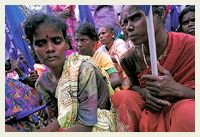
Image: Nina Berman/Aurora
Last year, in a one-room schoolhouse in the southern Indian state of Karnataka, under the watchful eyes of four elderly polling agents and posters of Shiva and Jesus, voters made history. Ramesh K, the first Dalit ever to run for a slot on the local council, won with 50 percent of the vote. His victory was echoed in local elections across the district, with Dalits, the social group formerly known as “untouchables,” capturing more than 300 seats. “The election was as hot as when Sonia Gandhi ran in Delhi,” laughed one villager. “It was the talk of the town.” It was also the latest victory for a growing Dalit civil-rights movement that is challenging India’s ancient social order.
For thousands of years, the Hindu caste system has functioned as a religiously sanctioned form of segregation; Brahmins, or the priestly caste, were at the top, followed by warriors, traders, laborers, and Dalits. India’s 1950 constitution outlawed the notion of “untouchability” and established special quotas for Dalits in education and government jobs. In the decades since, a successful Dalit elite has emerged: India’s president, K.R. Narayanan, is a Dalit.
But in rural areas, where the majority of India’s population lives, caste discrimination still flourishes. Dalits are expected to take menial jobs like cleaning latrines or burying the dead. Most live in extreme poverty and are denied land and decent jobs. “Caste feeling is so embedded in people that they accept it as normal,” says Theodore Sathyanandan, coordinator of the Christian Dalit Liberation Movement. “It’s new for Dalits to be fighting back.”
The Dalit movement has gained momentum by using tactics drawn from the South African struggle against apartheid and the US civil-rights movement. In cities and towns, activists have stormed local tea shops using the “two cup” system, which prohibits Dalits from using the cups reserved for people from higher castes. In Tamil Nadu, the Dalit Panthers, an organization modeled on the Black Panthers, has begun contesting parliamentary elections.
Now, Dalit organizations are building connections overseas. Along with Amnesty International and Human Rights Watch, they are working to raise the profile of “casteism” at the United Nations’ World Conference Against Racism in August. Their argument: Casteism is illegal under a U.N. convention that bans racial discrimination. (Human Rights Watch has just released a report on the issue.)
But the Dalit movement faces a backlash from Hindu nationalists. The National Campaign on Dalit Human Rights has recorded an increase in hate crimes against Dalits; at a public hearing last year, the group publicized cases ranging from the demolition of Dalit homes to the torturing of a Dalit man who had married a higher-caste woman. And Jaswant Singh, India’s external affairs minister, has spoken out against the efforts to get caste discrimination included in the U.N. meeting, criticizing what he calls “an attempt to dilute the focus of this conference.”
Activists are not surprised at the government’s stance. “For a long time, South Africa also resisted international intervention into its regime of apartheid,” says Smita Narula, author of a recent Human Rights Watch report on caste violence. “It’s time for India’s apartheid to be dismantled.”











